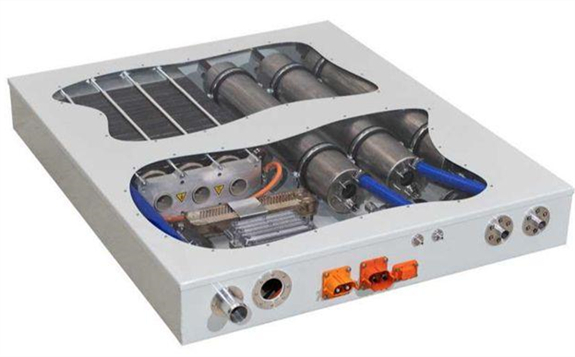Fuel cell maker Blue World Technologies, Alfa Laval and vessel owners DFDS, Maersk Drilling and Hafnia are developing fuel cells based on High-Temperature Proton Exchange Membrane (HTPEM) technology to assess their potential as a source of marine auxiliary power.

Funded by the Danish Energy Technology Development and Demonstration Program, testing will be held at the Alfa Laval Test & Training Centre in Aalborg.
The aim of the project is to establish a highly efficient and cost-effective HTPEM fuel cell solution, giving marine vessels a realistic alternative to combustion-based auxiliary power in future.
The fuel cell test setup will have a power of 200kW, but the fully developed and modular design should be possible to scale up incrementally to a level of 5 MW.
HTPEM fuel cells have a higher tolerance for thermal cycling than other fuel cell types and will provide clean operation with no particulate emissions, will use carbon-neutral renewable methanol as fuel.
Methanol is one of the most promising fossil-free fuels available for future shipping and is already being used in testing at the Alfa Laval Test & Training Centre. The fuel cell system concept, however, could be possible to adapt for fuels such as LNG and ammonia.
Lars Skytte Jørgensen, Head of Technology Development, Energy Solutions, Alfa Laval Marine Division, said: "Building on the scalability of automotive applications, we are convinced that methanol fuel cell systems can drastically reduce maritime climate and environmental impact. By further developing our technology in partnership with marine colleagues, and by ramping up our production capacity at the same time, we can deliver a fuel cell solution that is green, operationally sound and also commercially viable."
The three vessel owners will contribute insights regarding the operational and commercial implementation of the HTPEM fuel cell system.
DFDS, owner of one of Europe’s largest shipping networks, is actively moving away from fossil fuels and brings experience from other fuel cell projects.
Maersk Drilling, a Danish owner and operator of drilling rigs, has a strong focus on energy efficiency and brings experience of using auxiliary power for special applications.
Hafnia, owner of one of the world’s largest product tanker fleets, has a strategy of transitioning to viable future marine fuels and believes strongly in methanol. Hafnia brings deep knowledge of methanol bunkering and operations.
Mads Friis Jensen, Chief Commercial Officer and Co-founder, Blue World Technologies, said: "Fuel cells have the potential to expedite the green transformation of shipping. The technology will enable a new generation of very simple and reliable ships that will be much easier to digitize than the ships we have today. This will open up for exciting new opportunities."
Last week Alfa Laval opened a 1,600sqm Application & Innovation centre in Kolding to accelerate hygienic fluid handling technology (click here) for food and pharmaceutical applications.
The power of partnerships and alliances
ABB recently announced a strategic investment and development agreement with AFC Energy to further the advancement of fuel cell technology integration into its high-growth eMobility and data center segments (click here).
The partnership will work towards a zero emission, sustainable turn-key power solution for the growing number of current and prospective data centers currently servicing the world’s data storage and processing requirements. End-user spending on global data center infrastructure is projected to increase 6 percent in 2021 from the previous year.
SFC Energy became the newest member to join the European Clean Hydrogen Alliance this month.
"By joining the European Clean Hydrogen Alliance we want to contribute our know-how and experience to drive the development of the market for clean hydrogen technologies in Europe. At the same time, we look forward to a continuous and enriching dialogue with representatives from politics and industry", said Dr. Peter Podesser, CEO of SFC Energy.